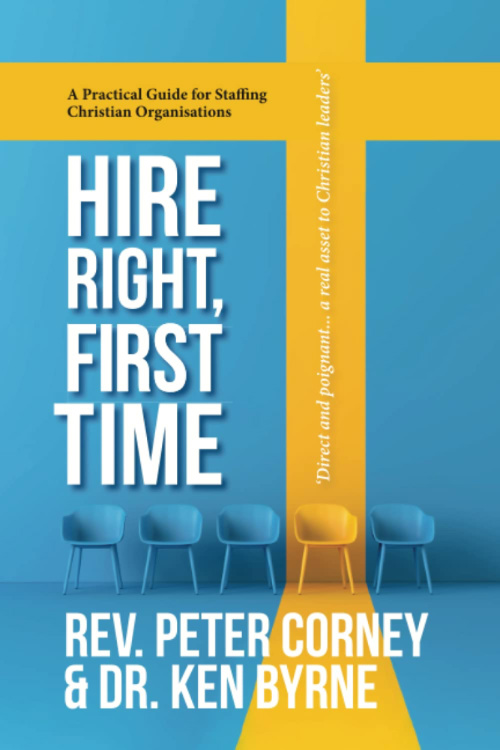
Dr KEN BYRNE, a corporate psychologist and co-author of ‘Hire Right, First Time: A Practical Guide to Staffing Christian Organisations’, looks at five of the most common hiring problems Christian organisations face…
All Christian organisations have at their core a dedication to spreading God’s grace in word and deed.
Doing so means that we have to hire people. Not anyone will do. We must have the right people.

Hiring the right people is the single most important thing you can do as manager or leaders, says Dr Ken Byrne. PICTURE: Headway/Unsplash
If you are a manager or leader, the single most important thing you can do to ensure your success it to hire the right people. Nothing is more important. Nothing.
Yet hiring is difficult and mistakes are common.
“If you are a manager or leader, the single most important thing you can do to ensure your success it to hire the right people. Nothing is more important. Nothing.”
Here we describe five of the most common hiring problems, and describe proven solutions.
1. Starting with the wrong question
When an opening occurs, we usually ask “Where will find someone?” or “What’s the best way to search for the right person?”
These questions need to be answered, but there is a more important question that should come first.
“What will the impact be if we choose the wrong person?”
Mistakes are very expensive, more so than most people realize.
There are the obvious costs. These include cost of recruiting, training time and overheads.
Quite real, but more difficult to calculate, are risks to your reputation, potential legal liability, poor morale or stress on the person managing the poor performer.
Most important – and most difficult to calculate – is the opportunity cost. It means considering this question: “Where would be now if we had hired the right person?”
Starting with this question has a way of focusing the mind, and bringing extra motivation to putting in the time and effort to necessary to do the job properly.
2. Limited attraction strategies
You must first answer the question “Why would someone want to work for us?”
People who apply to work for Christian organizations are often motivated by the mission of what you do. You must be able to spell this out in any advertising. For example:
• “Contribute to the rewarding ministry of serving disadvantaged youth.”
• “Join the largest provider of Christian leadership training in the country.”
• “We are a dynamic and rapidly growing church, with increased attendance of 50 per cent in the last year.”
While a job ad is important and necessary, just putting a notice on social media isn’t enough.
You want to tap the group of people who would consider moving, but who aren’t unhappy enough to actually start looking. They’ll never see your ad.
Start by looking at the contacts list in your phone. Send an email to everyone you know. Outline the job and emphasise what makes it attractive. Ask them to have anyone they know contact you. This is easy to do, and costs nothing.
Use your website. Place your ad front and centre, selling the job. Tell people what their next step is.
Create a recruitment video. This is free. Have someone on your staff take an IPhone and video staff explaining why they like working here. Put that on your website.
3. Hiring quickly.
Hiring is hard work. It takes a lot of time. It can feel like a distraction from our “real job”. It’s tempting to take shortcuts.
It is essential to develop a Structured Selection System. This is a step-by-step process that every applicant must complete before a hiring decision is made. At a minimum you must decide:
• How will we sort applications?
• Who will do the initial telephone Interview?
• What questions will we ask?
• How will we conduct the in-person interviews?
• What questions will we ask and in what order?
• Who will check references?
• How will we put together all of the information we need to make an informed, thoughtful decision?
All of this must be decided in advance, before you start recruiting. All new applicants must complete each step.

4. Hiring the mask, not the person behind it.
Everyone comes to an interview wearing a mask. Their job is to sell themselves as the best applicant. When faced with a less experienced interviewer, their weaknesses will be well hidden.
You must have questions that get behind the mask. Here are a few:
• Imagine you could instantly change anything about your personality. Don’t count looks or height, but consider the things that make you unique. What would you change?
• Think about the person in your life who is your toughest critic. If I were to ask them to describe you honestly, what would they say?
5. Failure to check references
This is the part of the hiring process most often done poorly. Everyone is tired. They want to get to a decision. Often people have reached a decision, usually by little more than gut feeling.
Yet, checking references must be done. Always. Insist on speaking only to past employers.
Use a Structured Guide, with the questions you want to ask carefully thought out.
We rely on our readers to fund Sight's work - become a financial supporter today!
For more information, head to our Subscriber's page.
Case example
A Christian organisation was awarded a government contract to work with troubled youth. They hired a social worker. Soon there were complaints from other staff about inappropriate, overly sexualised behaviour. No serious disciplinary action was taken.
The worker lost his laptop and it was turned into the police. In trying to find the owner, they discovered a hoard of child pornography.
The agency later learned that he had accessed a private government website to obtain the details of troubled young boys he could approach. He was later convicted of raping one of those boys.
Had the agency bothered to check his references they would have learned that he never studied social work, and did not have the qualifications he claimed.
This case probably highlights virtually all of the errors outlined above. It’s likely he was hired quickly, with a superficial interview. Little thought was given to the cost of a mistake. Clearly references were not checked.
What was the cost to the agency of this one mistake?
The article is excerpted in part from Hire Right, First Time: A Practical Guide for Staffing Christian Organisations by Rev Peter Corney and Dr Ken Byrne. It is published by Arrow Leadership.
This article contains an affiliate link.






